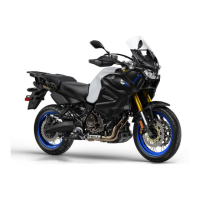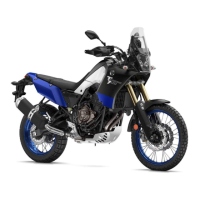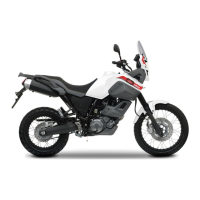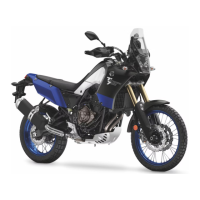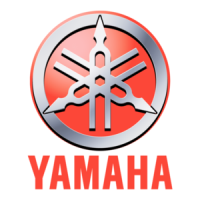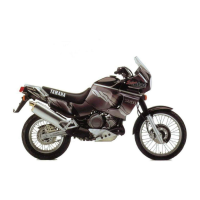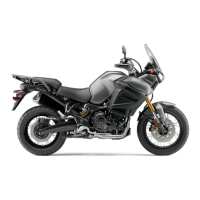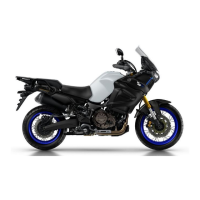
Do you have a question about the Yamaha Super Tenere ABS XT1200ZE and is the answer not in the manual?
| Engine Displacement | 1199 cc |
|---|---|
| Bore x Stroke | 98.0 mm x 79.5 mm |
| Compression Ratio | 11.0:1 |
| Fuel System | Fuel injection |
| Ignition | TCI |
| Starter | Electric |
| Transmission | 6-speed |
| Final Drive | Shaft |
| Width | 980 mm |
| Seat Height | 845 mm |
| Ground Clearance | 210 mm |
| Fuel Capacity | 23 liters |
| Wet Weight | 261 kg |
| ABS | Yes |
| Engine Type | Liquid-cooled, 4-stroke, DOHC, 4-valve |
| Power | 82.4 kW (112PS) @ 7, 250 rpm |
| Torque | 84 lb-ft (113 Nm) @ 6, 000 rpm |
| Front Suspension | 43mm telescopic fork, adjustable |
| Rear Suspension | Swingarm, adjustable |
| Front Brake | Dual 310 mm discs |
| Rear Brake | 282 mm disc |
| Front Tire | 110/80R19 |
| Rear Tire | 150/70R17 |
Explains the meaning of WARNING, NOTICE, and TIP notations used in the manual.
Owner's responsibilities for safe and proper operation of the motorcycle.
Guidance on pre-operation checks and making yourself conspicuous.
Ensuring proper posture, skills, and avoiding alcohol/drugs for safe riding.
Essential protective gear including helmets, jackets, boots, and gloves.
Precautions against carbon monoxide from engine exhaust in enclosed areas.
Tips for safely adding cargo or accessories to the motorcycle.
Guidance on using genuine Yamaha accessories for safety and performance.
Risks associated with aftermarket parts and modifications affecting safety.
Caution regarding electrical accessories exceeding system capacity.
Instructions for safely securing the motorcycle for transport.
Identifies key components of the motorcycle from the left side.
Identifies key components of the motorcycle from the right side.
Locates and names the various controls and instruments on the handlebars.
Details the immobilizer system and its keys for theft prevention.
Explains the functions of the main switch and steering lock positions (ON, OFF, LOCK).
Step-by-step guide to locking and unlocking the motorcycle's steering.
Explanation of various indicator and warning lights on the instrument panel.
Details on engine trouble, ABS, and Traction Control System warning lights.
Function and troubleshooting for the immobilizer system indicator light.
How to activate and set the cruise control system using handlebar switches.
Steps to adjust set speed and deactivate the cruise control system.
Conditions under which the cruise control system automatically deactivates.
Explains the components and operation of the multi-function meter unit.
Details on the tachometer, fuel meter, and eco indicator functions.
Explanation of transmission, drive mode, and traction control system indicators.
How to adjust grip warmer settings and select information display items.
Explanation of odometer, tripmeters, and fuel reserve tripmeter functions.
Information on elapsed time, air intake, and coolant temperature displays.
Details on how to view and reset average and instantaneous fuel consumption.
Navigating the setting mode and adjusting grip warmer temperature levels.
Procedures for resetting maintenance intervals and time trip data.
How to switch between kilometers and miles for display units.
Customizing the items shown on the information display pages.
Adjusting display brightness and setting the clock on the meter unit.
Resetting all display items and understanding D-mode (drive mode) selection.
Identification and function of left and right handlebar switches.
Operation of cruise control and drive mode switches.
Description of the clutch lever, its adjustment dial, and clutch switch.
Location and use of the shift pedal for gear changes.
Explanation of the unified brake system and brake lever operation.
Brake lever adjustment and operation of the rear brake pedal.
How the ABS works, self-diagnosis, and precautions for ABS use.
Explanation of the traction control system, modes, and indicator light.
How to change TCS modes and reset the system if disabled.
Instructions for opening and closing the fuel tank cap.
Safety guidelines for refueling and information on recommended fuel types.
Checks for overflow hose and information on the catalytic converter.
Step-by-step guide for removing and installing the rider seat.
Procedure to lower the rider seat height.
Procedure to raise the rider seat height.
How to adjust the windshield to one of four positions for rider preference.
How to adjust suspension preload for different load conditions.
Choosing the correct preload pictogram based on load conditions.
Adjusting damping force settings for front and rear suspension.
Setting the damping force to 7 different levels for optimal performance.
Information on standard and additional carriers and their weight limits.
Location of luggage strap holders below the passenger seat.
Operation of the sidestand and the ignition cut-off system.
Procedure to check the ignition circuit cut-off system for proper function.
How to use the auxiliary DC jack and safety warnings.
Checking fuel level, lines, and hoses before operation.
Checking engine oil level and final gear oil for leaks.
Checking front/rear brakes, clutch operation, fluid levels, and pads.
Inspecting wheels, tires, sidestand switch, and general fasteners.
Importance of understanding controls, lean angle sensor, and auto-stop system.
Steps to start the engine, including ignition cut-off system conditions.
How to shift gears and operate the transmission for optimal performance.
Riding techniques to improve fuel efficiency.
Crucial break-in period instructions for engine longevity.
Safe practices for parking the motorcycle, considering hot components.
Ensuring vehicle safety and efficiency through regular inspection and lubrication.
Services related to emissions control, requiring specialized skills.
Description of the owner's tool kit and its use for maintenance.
Chart detailing maintenance jobs for the emission control system by mileage.
Chart detailing general maintenance and lubrication tasks by mileage.
Lubrication points for chassis fasteners, brake/clutch lever/pedal pivots.
Maintenance checks for sidestand, front fork, and shock absorber assembly.
Checks and lubrication for final gear oil, brake switches, and throttle grip.
Checking operation of lights, signals, and switches, and headlight beam adjustment.
Procedures for removing and installing cowling A and cowling B.
Instructions for installing cowling B and cowling C.
Procedure for checking spark plug gap, condition, and cleaning/replacement.
Checks for canister hoses and how to check the engine oil level.
Step-by-step guide for changing engine oil and replacing the oil filter.
Instructions for installing the oil filter and refilling engine oil.
Checking engine oil filler cap and performing engine oil leakage checks.
Checking final gear oil level and procedure for changing the final gear oil.
Instructions for installing the final gear oil drain and filler bolts.
Procedure for checking coolant level and refilling the reservoir.
Instructions for changing coolant and replacing the air filter element.
Procedure for checking and correcting engine idling speed.
Measuring and adjusting throttle grip free play.
Importance of valve clearance adjustment by a dealer.
Checking tire condition, tread depth, and air pressure.
Tire pressure specs for different loads and warnings about worn tires.
Information on tubeless tires, valve types, and tire aging.
Using specified tires and breaking in new tires for optimal performance.
Checking spoke wheels for damage and the importance of wheel balancing.
Checking clutch lever free play and for hydraulic system leaks.
Ensuring no free play at the brake lever end for safe operation.
Adjustment of brake light switches, linked to cruise control system.
Procedure for checking brake pad wear indicators and lining thickness.
How to check brake fluid levels and precautions for refilling.
Intervals for changing brake and clutch fluids and replacing seals/hoses.
Ensuring smooth operation and lubricating pedal pivots.
Ensuring smooth operation and lubricating lever pivots.
Checking operation and lubricating pivots for stands.
Procedure for lubricating swingarm pivots by a dealer.
Checking front fork for damage and smooth operation.
Checking steering for wear or looseness to prevent danger.
Checking front and rear wheel bearings for play or smooth rotation.
VRLA battery maintenance and safety warnings regarding electrolyte.
Proper procedures for charging and storing the VRLA battery.
Location of fuse boxes and procedure for replacing blown fuses.
Steps to replace a headlight bulb and important precautions.
Procedure for installing the headlight bulb and adjusting the beam.
Steps to replace auxiliary light bulbs, involving windshield and headlight unit removal.
Installing the auxiliary light socket, headlight unit, and windshield.
Checking LED turn signal and brake/tail lights for proper function.
Procedure for removing and replacing the license plate light bulb.
General advice on troubleshooting and using genuine Yamaha replacement parts.
Flowcharts for diagnosing starting issues related to fuel, battery, ignition, and compression.
Steps to diagnose engine overheating and safety precautions for radiator cap.
Advice on cleaning and caring for matte colored parts to avoid damage.
Steps for cleaning the motorcycle, including removing stubborn dirt.
Precautions for cleaning plastic parts and avoiding high-pressure washers.
Steps to clean the motorcycle after exposure to corrosive elements.
Cleaning windshields and applying corrosion protection spray.
Warning about contaminants on brakes or tires affecting control.
Instructions for preparing the motorcycle for short-term and long-term storage.
Recommendation to perform any necessary repairs before storing the motorcycle.
Detailed specifications for vehicle dimensions, seat height, and weight.
Technical details of the engine, including combustion cycle, displacement, and oil.
Specifications for transmission, chassis, front/rear tires, and wheels.
Specifications for brakes, suspension systems, and electrical components.
Specifications for the battery model and headlight bulb wattage.
List of fuses with their amperage ratings.
Recording vehicle identification number and engine serial number.
Location of the diagnostic connector for service purposes.
Information on vehicle data stored by the ECU and Yamaha's privacy policy.
